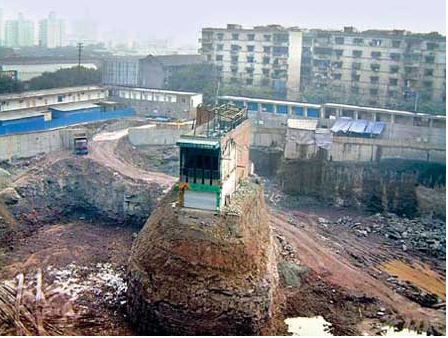Eminent Domain in China: Nail House Rock
What will the new property law in China hold for one woman’s battle against eminent domain?

“I have more faith than others….I believe that this is my legal property, and if I cannot protect my own rights, it makes a mockery of the property law just passed. In a democratic and lawful society a person has the legal right to manage one’s own property.” - Wu Ping
For two years, Ms. Wu Ping, a restaurant entrepreneur, has refused to yield to the unchecked power of developers. So her house stands in the middle of a construction site, towering above a 33-foot-deep pit. It is barricaded. They call it a "nail house" because it sticks out like a nail in neighborhoods have been "moved" (??) and because its owners are the last hold-outs. Dingzihu (???) is a Chinese word that means a household or person who refuses to vacate their home to make way for real estate development. Most of the other property owners in the Chonqing neighborhood have left. Photos of the house are all over the blogs and international media, although China's newspapers have been censored. Bloggers said the govenment decreed the subject was suddenly out of bounds.
The developer plans to build a six-story shopping mall on the site. The homeowners have all been compensated for their lost property, but Ms. Wu turned down the offer of about $525,000 for her 263 square-yard house because she believes, “A citizen’s legal property is not to be encroached on.” This was the slogan planted by her husband, a local martial-arts champion, on a hand-painted banner on the roof. Ms. Wu and her husband refuse to leave until they are given similar property in the area in compensation.
CNN reported, “Wu was offered 20 million yuan ($2.6 million) in compensation or two higher floors in the planned new building -- both of which she turned down because she wanted lower levels in the building so she could run her restaurant.”
Perhaps, under the new property law, Ms. Ping and her husband will get the compensation they seek. Under Chongqing law, as reported in the China Daily, there are three possible ways to compensate owners in this type of situation: 1) provide housing on the same spot; 2) provide housing in another spot; 3) provide a sum of money. The city is offering Ms. Wu the third option, instead she wants the city to find her a new home. Until this disagreement is resolved the house stands.
On January 11, 2007, the developer brought an administrative action against Ms. Wu with the Chongqing Jiulongpo District Housing Management Bureau, the department responsible for the redevelopment. The department gave Ms. Wu these choices- move within 15 days voluntarily or file a suit with the Chongqing Jiulongpo District Court within three months or apply for a reconsideration within 60 days from the city’s District Government or Municipal Housing Bureau.
Ms. Wu refuses to accept, as quoted in the Legal Daily reporter, “the mistaken ruling.” Ms. Wu, stated earlier, that she has the property and land right papers that clearly indicate that she has full ownership of 219 square meters. Ms. Wu also said during a telephone interview that most shop owners choose the property return option to the cash option because the compensation offered is very low. Also she had just renovated the property.
The new property law, although not completely in favor of private property ownership, offers the same protection for private and public property, unlike the law in Communist China where the collective was emphasized the government provided and controlled housing.
Ms. Wu is fighting for her property because she finds the taking illegal under the new property law. “They said they were going to demolish our house because it is in the public interest," she said. "But they are going to build a shopping center, which has nothing to do with the public interest! It is a business move, and what the court ruling protects are the developers' interests!”
The public outcry created by one couple’s battle against a possibly unconstitutional taking puts China another step closer to limiting the use of eminent domain and taking property only when it is truly in the public interest. The fate of the “nail house” remains to be seen.
Read the interview with Wu Ping.
Great minds think alike: I posted on the same topic, since the photo reminded me of that classic Bugs Bunny cartoon where he holds out against development in much the same way. I wonder whether there will be any teeth behind the law, allowing the "property" owner to either stop the transfer, or at least get fair compensation.
Remember, we're dealing with Communist China. The fact that this woman's house remains and her argument over compensation and relocation goes on is testament to the fact that China is changing. We suspect that she will prevail. The worldwide attention that her case has garnered will push the powers that be to settle her claim.
